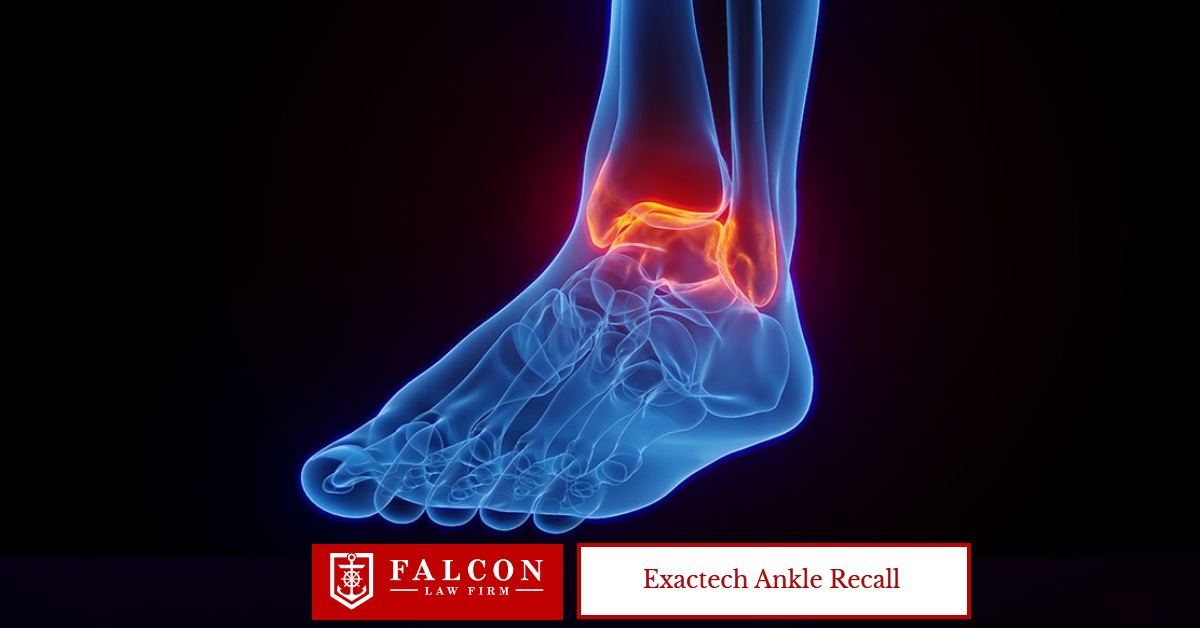
Exactech Ankle Recall
In August 2021, Exactech issued a recall for the polyethylene liner for all ankle replacements and the recall was later updated in February 2022. The recalled polyethylene plastic insert mimics cartilage in the ankle and fits between the talar component and tibial component.
As we discussed in our post about the Exactech Recall Lawsuit, the company said that more than 147,000 devices damaged by faulty packaging are subject to this recall. Defective packaging exposed the liners to oxidation which caused the premature degradation of the artificial joints. This could lead to adverse effects for patients who have had these devices implanted.
Today, we’ll discuss the Exactech ankle recall, how these defective implants impact patients, and what to do if you have one of these devices.
Exactech Ankle Recall
Patients who have received a total ankle replacement with an implant subject to the Exactech recall may experience symptoms of degradation earlier than expected. This is a result of excess oxygen exposure to the insert of the joint implant. When this insert deteriorates too quickly, the joint can no longer absorb the sort of impact that comes with everyday life, such as walking. This will likely result in pain and injury for the patient.
Symptoms of a defective ankle implant include:
Inserts vs Liners
Some surgeons use the terms “liner” and “insert” interchangeably. These terms both refer to plastic parts made of polyethylene that act like cartilage in joint implants.
However, the term “liner” is most associated with hip implants. Liners fit into acetabular cups to provide a cushion between the cup and femoral head (or ball). “Insert” refers to the flat piece of polyethylene plastic that provides the cartilage replacement in ankle or knee implants.
In knee implant surgery, inserts may be fixed to the tibial implant. This type of prosthesis is called a fixed-bearing prosthesis. In contrast, mobile-bearing implants used in ankle replacement surgery have an insert that can move around in the tibial tray. In theory, this allows for more range of motion.

Will I need Revision Surgery?
Not all patients may have problems with their devices, and Exactech doesn’t recommend replacing ankle devices in people who aren’t having issues with their implants. However, if you are experiencing any of the aforementioned symptoms you may need revision surgery.
Revision joint replacement is a surgical procedure that replaces a previously-implanted joint. Revision surgery is often more complicated and difficult to perform. There may be excess scar tissue left over from the first surgery, and a reduction in the amount of healthy bone to work with. Deteriorated implants can lead to infection in the bone, further complicating surgery.
If you aren’t sure if your joint replacement implant is subject to the Exactech ankle recall, contact your doctor. They will be able to look up the serial number of your implant and confirm whether or not you have an affected Exactech implant.
What if I Have a Recalled Exactech Ankle Implant?
How Can the Falcon Law Firm Help?
You may be entitled to compensation for the damage done to your body by recalled implants. The attorneys at Falcon are ready to help if you or a loved one are experiencing the symptoms of a defective Exactech ankle implant or if your doctor has suggested revision surgery.
The personal injury attorneys at Falcon Law Firm stand ready to represent you against Exactech.

